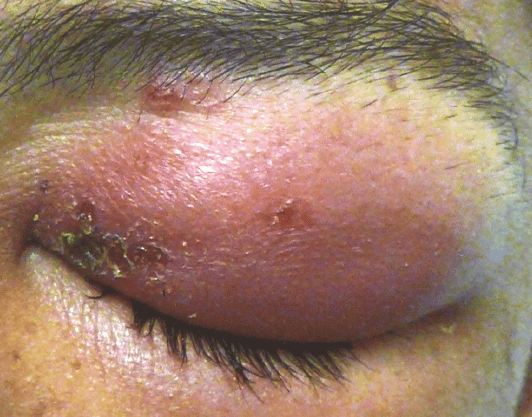Eye or ocular herpes is a viral infection of the eyes that can result in pain, inflammation, and discharge. This condition is most commonly caused by the herpes simplex virus (HSV), although other viruses can also lead to ocular herpes.
The American Academy of Ophthalmology reports that around 24,000 new cases of eye herpes are diagnosed each year in the United States.
Types of Eye Herpes (Ocular Herpes)
The most prevalent form of eye herpes is epithelial keratitis, where the virus affects the thin outermost layer of the cornea known as the epithelium.
Another type of ocular herpes affects the cornea’s deeper layer called the stroma, leading to a condition known as stromal keratitis.
Stromal keratitis is more severe than epithelial keratitis because it can cause significant damage to the cornea, potentially leading to blindness and recurring episodes.
Eye Herpes Symptoms
Symptoms of eye herpes include redness and a burning sensation in the eye, along with discharge. Additionally, individuals with eye herpes may experience sharp or stabbing pain in one or both eyes, which can radiate to the face, neck, or back. Infections of the cornea and conjunctiva (the eye’s front section) can cause vision loss in severe cases.
Other symptoms of eye herpes include:
- Light sensitivity
- Inflamed eyelids
- Frequent tearing
- Red blisters on the upper eyelid
These herpes symptoms usually appear within two to four days post-exposure and can last for several days. With proper treatment, the duration of these symptoms can be shortened.
Eye herpes can be mistaken for conjunctivitis, often known as pink eye. While both infections can be caused by viruses, conjunctivitis can also result from allergens, bacteria, or chemicals, unlike eye herpes.
Effective Ways To Avoid Eye Herpes
To prevent the recurrence of eye herpes, practicing good personal hygiene is essential. Clean your eyes regularly and use gloves when applying eye drops to avoid contamination. Limiting exposure to ultraviolet (UV) rays can also help, so it’s advisable to wear sunglasses when outdoors for added protection. Avoid rubbing your eyes as this can spread the virus or further irritate them. Additionally, washing your eyes with clean water frequently can be beneficial.
Although eye herpes tends to heal within 1 to 2 weeks, it may take longer in some cases. Treatment with herpes medications is necessary to reduce the risk of complications.
